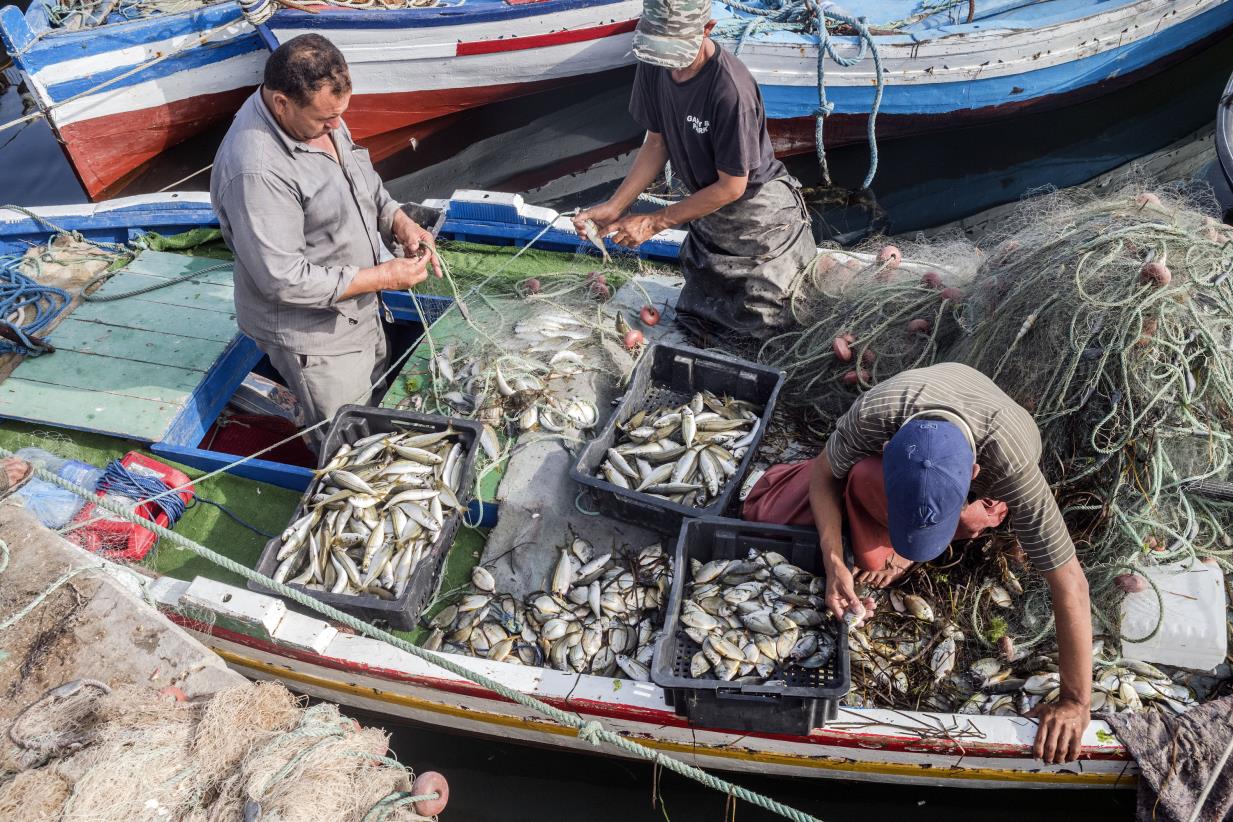The Blue Transformation of aquatic food systems is crucial for the future of food in the Near East and North Africa region

©Nikos Economopoulos/Magnum Phot - Fishermen in the port of Ajim, Tunisia.
8 June 2021, Cairo - The Blue Transformation of the region’s aquatic food systems is crucial to ensuring food and nutrition security in the Near East and North Africa (NENA) region, FAO Assistant Director-General and NENA Regional Representative Abdulhakim Elwaer said today during a webinar organized by FAO on World Oceans Day.
“The Blue Transformation initiative of FAO recognizes the unique benefits of aquatic foods for food and nutrition security, livelihoods, trade, and as the source of the social values that gel many societies together. Blue Transformation is needed to acknowledge successes while facing head on the sector’s sustainability challenges”, explained Manuel Barange, FAO’s Fisheries Director.
The webinar was organized to shed the light on the vital role aquatic food plays in the region’s future. In this special webinar hosted by FAO Regional Office for Near East and North Africa (NENA), food system leaders, research experts, and policy specialists convened to share perspectives and develop strategies to drive the sustainable blue transformation of aquatic food systems for healthy oceans and people.
“In order for the aquatic food to continue playing an important role in the nutrition and livelihoods of communities, the sustainability of both capture fisheries and the aquaculture sectors must become a top priority throughout the region,” Elwaer declared during his interventions in the webinar. “The sustainability of these resources remains plagued by a combination of challenges, including illegal, unreported and unregulated fishing (IUU), scarce water resources, as well as vulnerability to climate change impacts,” he added.
The NENA region with its generally arid climate, predicted population growth and increased water scarcity, needs a coordinated regional approach to increase fish production and consumption, rural employment and the sustainable use and conservation of the aquatic resources. In the meantime, it can make a fruitful
FAO has been working on a number of programmes aimed at promoting and facilitating regional cooperation and management and supporting the sustainability of aquaculture and fisheries.
FAO is taking a number of steps together with partners to promote sustainable fisheries and combat illegal fishing, including working to promote adherence to the 2009 FAO Port State Measures Agreement in addition, 2014 FAO Voluntary Guidelines on Flag State Performance.
At the same time, the Organization is embracing the "Blue Transformation", as sustainable and resilient transformed blue food systems must play a critical role in Agenda 2030”, the Assistant Director-General and Regional Representative said.
The Blue Transformation initiative emerged from the priorities of the 2021 FAO Declaration on Sustainable Fisheries. It requires sustainable intensification of aquaculture, effectively managed fisheries as well as upgraded blue value chains that provide additional source of supply, ensure socio-economic benefits, while also ensuring just distribution and access to aquatic food.
In the United Arab Emirates (UAE), FAO is working with the government to make it a global hub for agricultural technology and innovation. Fish farming is a great example of innovation being successfully applied. With technical support from FAO, the UAE is investing in modern technologies to build sustainable and profitable aquaculture production that will maintain the country’s fish supply, improve its food security and transform its food system. Innovations include integrated aquaculture systems, aquaponics or Recirculating Aquaculture Systems (RAS), that allow the farming of fish species like salmon or grouper, even in the middle of the desert.
In Algeria, Egypt and Oman, like in other countries in this region, water is not the only challenge; there are also shortages of good quality soil. Of the region’s total area suited for agriculture, 45 percent of it faces high salinity, depleted nutrients and problems of erosion. Aquaponics and integrated agri-aquaculture (IAA) are a solution for producing vegetables, fruits and other food in inhospitable or non-useable lands. In light of this, FAO organized farmer-to-farmer between the three countries study tours in 15 integrated agri-aquaculture (IAA) farms, learning new tips and techniques from each other.
In 2019, the Regional Commission for Fisheries (RECOFI) has reached agreement on sustainable fisheries management practices for Kingfish (Scomberomorus commerson) in the region. The decision calls for an agreement by all member states on scheduled closure periods for fishing Kingfish in the region, thereby lessening fishing pressure on the stocks and allowing for stock rebuilding efforts. The implementation was made for the first time in 2020.
